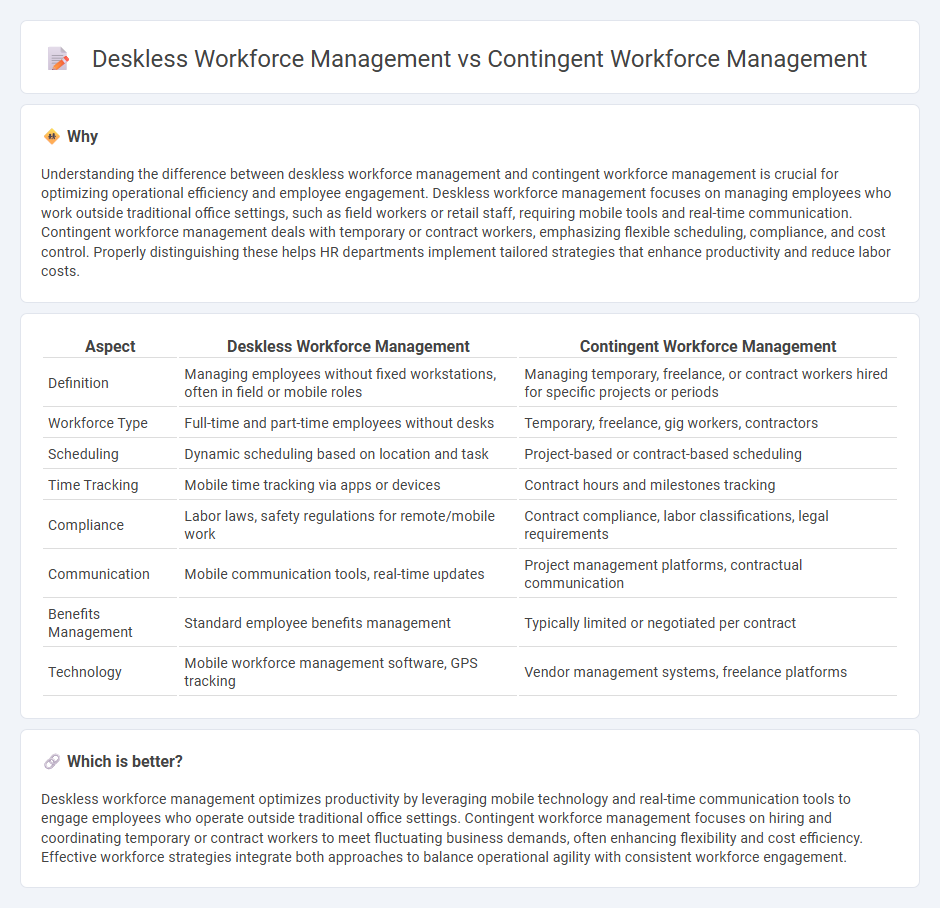
Efficient deskless workforce management focuses on optimizing mobile employee productivity through real-time communication, task tracking, and location-based scheduling, while contingent workforce management centers on the strategic onboarding, compliance, and integration of temporary or freelance workers. Both approaches demand tailored technology solutions to address unique operational challenges and enhance workforce agility. Explore how these management strategies can transform your organization's labor dynamics.
Why it is important
Understanding the difference between deskless workforce management and contingent workforce management is crucial for optimizing operational efficiency and employee engagement. Deskless workforce management focuses on managing employees who work outside traditional office settings, such as field workers or retail staff, requiring mobile tools and real-time communication. Contingent workforce management deals with temporary or contract workers, emphasizing flexible scheduling, compliance, and cost control. Properly distinguishing these helps HR departments implement tailored strategies that enhance productivity and reduce labor costs.
Comparison Table
| Aspect | Deskless Workforce Management | Contingent Workforce Management |
|---|---|---|
| Definition | Managing employees without fixed workstations, often in field or mobile roles | Managing temporary, freelance, or contract workers hired for specific projects or periods |
| Workforce Type | Full-time and part-time employees without desks | Temporary, freelance, gig workers, contractors |
| Scheduling | Dynamic scheduling based on location and task | Project-based or contract-based scheduling |
| Time Tracking | Mobile time tracking via apps or devices | Contract hours and milestones tracking |
| Compliance | Labor laws, safety regulations for remote/mobile work | Contract compliance, labor classifications, legal requirements |
| Communication | Mobile communication tools, real-time updates | Project management platforms, contractual communication |
| Benefits Management | Standard employee benefits management | Typically limited or negotiated per contract |
| Technology | Mobile workforce management software, GPS tracking | Vendor management systems, freelance platforms |
Which is better?
Deskless workforce management optimizes productivity by leveraging mobile technology and real-time communication tools to engage employees who operate outside traditional office settings. Contingent workforce management focuses on hiring and coordinating temporary or contract workers to meet fluctuating business demands, often enhancing flexibility and cost efficiency. Effective workforce strategies integrate both approaches to balance operational agility with consistent workforce engagement.
Connection
Deskless workforce management and contingent workforce management are interconnected through their focus on optimizing labor flexibility and productivity for non-traditional employee groups. Both strategies utilize technology-driven solutions such as mobile apps and cloud-based platforms to streamline scheduling, communication, and performance tracking for frontline and temporary workers. Integrating these management approaches enhances operational efficiency, workforce engagement, and real-time data insights across diverse labor segments.
Key Terms
**Contingent Workforce Management:**
Contingent workforce management centers on efficiently overseeing temporary, freelance, or contract workers to optimize talent acquisition, compliance, and cost control. It involves advanced tools for tracking worker availability, contract terms, and performance metrics to ensure flexibility and productivity in dynamic labor markets. Discover how robust contingent workforce management solutions can transform your business's operational agility and reduce workforce-related risks.
Vendor Management System (VMS)
Vendor Management Systems (VMS) streamline contingent workforce management by automating procurement, tracking compliance, and optimizing supplier performance. Deskless workforce management focuses on real-time communication, task management, and mobile accessibility to enhance field employee productivity. Explore how integrating VMS with deskless workforce tools can revolutionize your workforce strategy.
Independent Contractors
Contingent workforce management involves overseeing temporary, freelance, and independent contractor engagements, emphasizing compliance, contract negotiation, and flexibility. Deskless workforce management targets employees who operate outside traditional office settings, focusing on mobile technology integration, real-time communication, and productivity tracking. Explore the distinct strategies and tools vital for optimizing independent contractor performance within both workforce models.
Source and External Links
What Is Contingent Workforce Management Software? - TalentDesk - Contingent workforce management software helps companies handle non-payroll workers like freelancers and contractors, with models including centralized, decentralized, and hybrid management approaches alongside strategic partnerships for talent sourcing.
Everything You Need to Know About Contingent Workforce ... - Conexis VMS - Contingent workforce management is the strategic process of sourcing and organizing external workers, emphasizing standardized policies, compliance risk mitigation, cross-functional collaboration, and possibly outsourcing to managed service providers.
How Does Contingent Workforce Staffing Work? - nextSource - Contingent workforce staffing involves recruiting temporary or contract workers for specific roles or projects, offering cost-effectiveness and flexibility, with best practices including clear delegation of workloads between internal staff and contingent workers.
 dowidth.com
dowidth.com